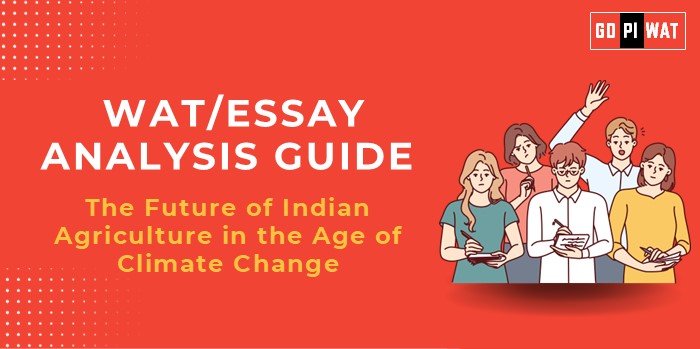📋 Written Ability Test (WAT)/Essay Analysis Guide: The Future of Indian Agriculture in the Age of Climate Change
🌐 Understanding the Topic’s Importance
India faces a paradox: while its agriculture supports 1.4 billion people, the sector remains acutely vulnerable to climate change. This makes the topic crucial for understanding the interplay between sustainability, policy-making, and technological innovation.
⏳ Effective Planning and Writing
- Time Allocation:
- Planning: 5 minutes
- Writing: 20 minutes
- Review: 5 minutes
- Preparation Tips:
- Highlight key facts and recent government initiatives.
- Incorporate examples of success stories and global benchmarks.
💡 Introduction Techniques for Essays
- Contrast Approach: “India, one of the largest global food producers, now faces the paradox of sustaining agricultural output amidst worsening climate risks.”
- Solution-Based Approach: “As climate change accelerates, India must prioritize transitioning to sustainable agricultural practices to ensure food security for its growing population.”
📊 Structuring the Essay Body
🏆 Achievements:
- Increased adoption of solar-powered irrigation systems.
- Success in organic farming certifications and export growth.
📉 Challenges with Comparative Analysis:
- Rain-fed dependency: Over 50% of India’s farmland lacks assured irrigation.
- Global comparisons: India’s per hectare rice yield (2.9 tonnes) lags behind China (6.7 tonnes).
🔮 Future Outlook:
- Promote climate-resilient crops like millets and sorghum.
- Expand renewable energy applications in irrigation and storage.
📄 Concluding Effectively
- Balanced Perspective: “India’s agricultural future hinges on its ability to integrate sustainability with growth while addressing climate vulnerabilities.”
- Global Comparison Approach: “Learning from global leaders like Israel and the Netherlands, India can position itself as a pioneer in sustainable agriculture.”
🔍 Analyzing Successes and Shortcomings
✅ Successes:
- Increased focus on water-saving technologies and farmer subsidies.
⚠️ Ongoing Challenges:
- Limited penetration of modern agricultural practices in rural areas.
🌍 Global Context:
- The Netherlands demonstrates high yields through agri-tech innovations despite limited land.
🛠️ Recommendations for Sustainable Progress
- Expand Agri-Tech: Scale up affordable solutions like AI-powered pest control and IoT-based soil monitoring.
- Policy Reforms: Increase funding for R&D in climate-smart agriculture.
- Public-Private Collaboration: Promote partnerships to ensure technology accessibility for small farmers.
📑 Sample Short Essays
Balanced Perspective:
“Climate-smart agriculture is vital for India’s food security, but inclusive policies are essential to bring all farmers on board.”
Solution-Oriented:
“Technological innovation and renewable energy integration can mitigate climate risks and enhance agricultural productivity.”
Global Comparison:
“Drawing on global best practices, India can evolve its agricultural framework to combat climate change while securing farmer livelihoods.”


